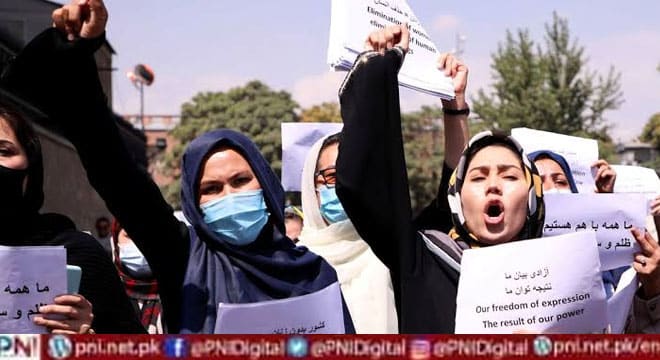KARUIZAWA 18 April (Online): G7 foreign ministers on Tuesday demanded the “immediate reversal” of a Taliban government ban on Afghan women working for non-governmental organizations and the United Nations in Afghanistan.
Under their austere interpretation of Islam, Taliban authorities have imposed a slew of restrictions on Afghan women since seizing power in 2021, including banning them from higher education and many government jobs.
In December, they banned women from working for domestic and foreign non-governmental organizations. On April 4, the curb was extended to UN offices across the country, triggering international outrage.
“We call for the immediate reversal of unacceptable decisions restricting human rights and fundamental freedoms, including the latest bans prohibiting Afghan women from working for NGOs and the UN,” the top G7 diplomats said in a statement after two days of talks in Japan.
The group also slammed the Taliban authorities’ “systematic abuses of human rights of women and girls and discrimination against the members of religious and ethnic minorities.”
In a statement to AFP, Taliban government spokesman Zabihullah Mujahid dismissed the G7 call.
“Foreign countries should not interfere in the internal affairs of Afghanistan,” he said.
“The values and laws that are being enforced or implemented in Afghanistan are matters concerning Afghans only and have nothing to do with other countries.”
Mujahid said foreign countries “should study and accurately monitor the situation in Afghanistan” by engaging with Kabul — hinting at diplomatic engagement that most nations cut off when the Taliban ousted a US-backed government.
“They should be in touch with us and then take a stand,” he said.
The Taliban’s supreme leader Hibatullah Akhundzada, in a statement ahead of the Muslim festival of Eid Al-Fitr, also called for the international community to butt out of Afghanistan’s affairs.
“Afghanistan wants positive relations with its neighbors, Islamic countries, and the world based on mutual benefits and within the framework of Islamic principles,” Akhundzada said.
“Afghanistan does not want to interfere in the internal affairs of other countries, it also insists that other countries should not interfere in our internal issues.”
The UN has said the ban on Afghan women working for its mission forces it to make an “appalling choice” on whether to continue operations in Afghanistan.
It says it cannot comply with the ban as it is “unlawful under international law, including the UN Charter.”
Over the past two weeks, the UN has ordered all its Afghan staff, men and women, not to report to offices until further notice.
Local employees make up the bulk of the 600 women working for the UN in the country. In total, there are about 3,300 Afghans in the country’s 3,900-strong UN workforce.
The restriction will also hamper donation-raising efforts by the UN at a time when Afghanistan is enduring one of the worst humanitarian crises in the world, UN officials say.
The UN airlifted $1.8 billion into Afghanistan between December 2021 and January 2023, funding an aid lifeline for the nation’s 38 million citizens and shoring up the domestic economy.
In other restrictions placed on Afghan women since 2021, authorities have barred teenage girls from secondary school, while women have been pushed out of many government jobs, prevented from traveling without a male relative and ordered to cover up outside the home, ideally with a burqa.
Women have also been banned from universities and are not allowed to enter parks, gyms or public baths.
Follow the PNI Facebook page for the latest news and updates.









